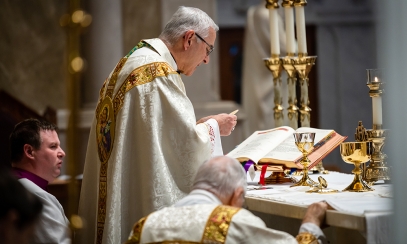
The ‘Bare minimum’ is not always best
The bare minimum
We are all familiar with attending Mass on Christmas or Easter and seeing the church packed. It’s unlike any other day in the liturgical year. People you do not usually see on Sunday all of a sudden appear during those solemnities. Some people come to satisfy an obligation — receiving Holy Communion at least once a year. The precept states: “After being initiated into the Most Holy Eucharist, each of the faithful is obliged to receive Holy Communion at least once a year.” (Canon 920, 1) “This precept must be fulfilled during the Easter season unless it is fulfilled for a just cause at another time during the year.” (920, 2) Naturally, this obligation involves preparation by the sacrament of reconciliation.
The Catholics who only come to church once or twice a year are misperceiving the precept and, ultimately, are fulfilling a requirement that is the bare minimum. As a result, Mass attendance on Sundays and holy days of obligation gets neglected. In actuality, the Church encourages the faithful to frequent the sacraments of Holy Communion and confession throughout the year.
A sacrament of frequency
There are sacraments meant to be received only once: baptism, confirmation, and holy orders. These sacraments leave an indelible mark on the soul. There are certain sacraments available on a frequent basis, particularly the sacrament of confession.
Why frequently? Christ says, “I have not come to call the righteous but sinners to repentance.” (Lk 5:32) We frequent the sacrament in order to respond to God who calls us. Frequent confession is good because we sin frequently. We also have the tendency to sin due to our fallen nature. The frequency of going to confession depends on the availability of the sacrament. Priests, however, are obliged to hear confessions of the faithful when they request it reasonably. St. John Bosco told his boys: "Go to confession and Communion as often as your confessor allows, and when you can, visit Jesus in the Blessed Sacrament." There’s no limit to God’s mercy. Why limit the opportunity to receive His mercy?
The sacrament of conversion
Confession has other names: the sacrament of penance, reconciliation, forgiveness, and conversion. Confession as “the sacrament of conversion” reminds us of how often we need to turn our hearts back to God. Conversion is a process, not a single moment. It begins with a single moment, such as St. Paul’s conversion, yet that moment is only the beginning. God willingly receives us repeatedly in the confessional. In confession, the opportunity for grace outweighs our countless number of sins. Where sin abounds, grace abounds all the more.
Benefits of frequent confession
The Catechism lists six spiritual effects of the sacrament of confession.
First, confession allows reconciliation with God by which the penitent recovers grace. By choosing to sin, we separate ourselves from God. If we have committed a mortal sin, our state of grace is restored in the sacrament meaning God’s presence dwells within us. If we have committed venial sins, then those sins are also forgiven and wiped away.
The second effect is reconciliation with the Church. Sin grieves the heart of Christ and the heart of His Bride, the Church. We know well how sin damages our relationships with one another, family, friends, and society. Each time we make a good confession, we walk away with the grace to love our neighbor and be reconciled with the Church.
Third is the remission of the eternal punishment incurred by mortal sins. The gravest punishment due to sin is eternal separation from God. Only God’s mercy, greater than any evil, has the power to remove this punishment. God willingly embraces us when we are at our worst.
The fourth effect is remission, at least in part, of temporal punishments resulting from sin. Whether sin is venial or mortal, it incurs punishment. God remits the punishment due to our sins, at least in part.
Second to last, peace and serenity of conscience and spiritual consolation are obtained through confession. There is peace only God gives. While peace is not always felt, it is an effect of God’s mercy. Sometimes people feel great joy overcome them after confession.
Lastly, confession enables an increase of spiritual strength for the Christian battle. There are daily spiritual battles we face constantly. Because of “wounded pride” it is necessary to equip ourselves with the spiritual armor that Christ offers us.
The joy of reconciliation
As stated earlier, there is no limit to God’ mercy. Taking the “bare minimum” approach to confession and, subsequently, the Blessed Sacrament is, most certainly, not ideal. The grace obtained through the sacraments is undeniable. Who hasn’t seen or heard of a parent rejoice after seeing their wayward child “finally” go to confession? So, whether someone goes once a year or is going for the first time in 10 years, let us rejoice and encourage a more regular participation in the sacraments, especially the sacrament of confession, for each time a person receives this sacrament, the saints in Heaven rejoice over a repentant sinner.
The L.I.H.M. Sisters were founded in the Philippines in 1991, dedicated to the evangelization and formation of youth and their families. The sisters arrived in Hanceville in 2014 and currently serve Cullman’s Sacred Heart Elementary School and St. Bernard Prep School as teachers.



